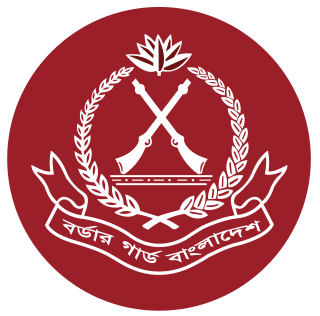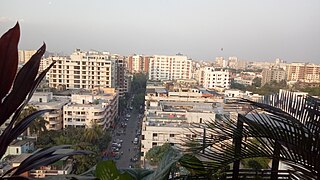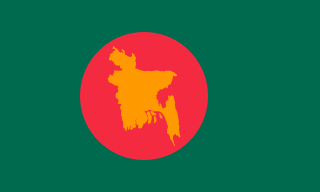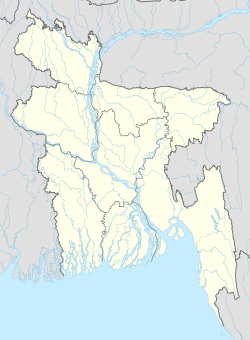Hamidur Rahman was a sepoy in Bangladesh Army during the Bangladesh Liberation War. Rahman was killed on 28 October 1971 at Dholoi during the Battle of Dhalai, Srimangal during an attempt to capture the Pakistani Army position. The advancing Mukti Bahini column finally captured the Dhalai Border Outpost on 3 November 1971. He was posthumously awarded the Bir Sreshtho, the highest recognition of bravery in Bangladesh. The Dhalai post was eventually captured permanently by three infantry battalions belonging to 61 Mountain Brigade, one battalion belonging to East Bengal Regiment and 7 Rajputana Rifles supported by an artillery brigade of the Indian Army fought against 12 Frontier Force Regiment of the Pakistan Army.
Munshi Abdur Rouf BS was a Lance Nayek in the 11th Wing of East Pakistan Rifles during the Bangladesh Liberation War. He enlisted in the East Pakistan Rifles on 8 May 1963, and was attached with a regular infantry unit during the War of Liberation. Rouf died on 8 April 1971 at Burighat in Chittagong Hill Tracts after causing extensive damage to the Pakistani Army with his machine gun and forcing them to retreat. He was buried at Naniarchor Upazila in Rangamati District.

The Bangla Academy is the official regulatory body of the Bengali language in Bangladesh. It is an autonomous institution funded by the Government of Bangladesh that fosters the Bengali language, literature and culture, works to develop and implement national language policy and conducts original research in Bengali. Established in 1955, it is located in the Burdwan House in Shahbagh, Dhaka, within the grounds of the University of Dhaka and Suhrawardy Udyan. The Bangla Academy hosts the annual Ekushey Book Fair.

The Border Guard Bangladesh (BGB) is a paramilitary force responsible for the border security of Bangladesh. The BGB is entrusted with the responsibility to defend the 4,427 kilometres (2,751 mi) border of Bangladesh with India and Myanmar. It was formerly known as the Bangladesh Rifles (BDR).

Munshi is a Persian word, originally used for a contractor, writer, or secretary, and later used in Mughal India for native language teachers, teachers of various subjects, especially administrative principles, religious texts, science, and philosophy and were also secretaries and translators employed by Europeans.

Cumilla Cadet College is a residential military high school and college in Cumilla, Bangladesh, for boys in grades 7 to 12. In recent years it has placed among the top ten schools in its region in student performance several times.

Faujdarhat Cadet College is a historic public military high school being the first of its kind in Bangladesh and second in entire Pakistan, modelled after public schools in the UK, run following the national curriculum of Bangladesh in English version, financed partially by the Bangladesh Army, located at Faujdarhat, near Chittagong, in Bangladesh.
Awards and decorations of the Bangladesh Liberation War were decorations bestowed by the major warring parties for actions during the Bangladesh Liberation War. Bangladesh, India and Pakistan all issued awards and decorations related to the conflict.

Rafiq Uddin Ahmed was a protester killed during the Bengali Language Movement that took place in East Pakistan in 1952. He is considered a martyr in Bangladesh.

Abdus Salam was a demonstrator who died during the Bengali Language Movement demonstrations which took place in the erstwhile East Bengal, Pakistan in 1952. He is considered a martyr in Bangladesh.

Khandakar Abdur Rashid, better known as Abdur Rashid Tarkabagish was a Bangladeshi politician and Islamic scholar. His career spans from the anti-colonial independence movement to the establishment of both Pakistan and Bangladesh. Tarkabagish was the second president of the All Pakistan Awami Muslim League, and served as a member of the National Assembly of Pakistan and later the Parliament of Bangladesh. Despite being a member of the treasury bench, he opposed what he considered to be the repressive mentality of the Nurul Amin government towards the Bengali Language Movement.

Dhanmondi is an upscale residential and commercial neighbourhood and a thana in Dhaka, Bangladesh, known for its central location, cultural vibrancy and being home to the country's founder, Sheikh Mujibur Rahman. Dhanmondi Thana falls within the administrative areas of both the Dhaka North and Dhaka South city corporations. It fully encompasses wards 49 and partially includes wards 47 and 48.
2000 (MM) was a century leap year starting on Saturday of the Gregorian calendar, the 2000th year of the Common Era (CE) and Anno Domini (AD) designations, the 1000th and last year of the 2nd millennium, the 100th and last year of the 20th century, and the 1st year of the 2000s decade.
1973 (MCMLXXIII) was a common year starting on Monday of the Gregorian calendar, the 1973rd year of the Common Era (CE) and Anno Domini (AD) designations, the 973rd year of the 2nd millennium, the 73rd year of the 20th century, and the 4th year of the 1970s decade.

Independence Day is celebrated on 26 March as a national holiday in Bangladesh. It commemorates the country's declaration of independence from Pakistan in the early hours of 26 March 1971.
ʻAbd al-Raʼūf is a male Muslim given name. It is built from the Arabic words ʻabd and al-Raʼūf, one of the names of God in the Qur'an, which give rise to the Muslim theophoric names. It means 'servant of the Lenient One'.
The Battle of Rangamati-Mahalchari Waterway was a strategic battle during the Bangladesh Liberation War in April 1971, in which the Pakistani Army successfully captured the Rangamati-Mahalchari waterway, overcoming the Mukti Bahini forces.

A. K. M. Abdur Rouf was the founder-curator of the Bangladesh Film Archive (BFA). He was awarded Ekushey Padak in 2010 for his contribution to arts and Independence Day Award in 2016 in recognition of his outstanding contributions to the nation by the government of Bangladesh.











